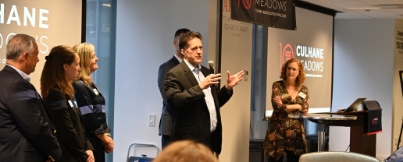THE CLASSIC DOUBLE IRISH WITH A DUTCH SANDWICH (“DIDS”)
In Part I of this article, I discussed the mechanism by which some very prominent U.S. multinational companies have been able to reduce global income tax on mobile income, such as royalties on sales of software to, at times, almost nil by routing such income through a structure involving two Irish companies (top tier called “Irish 1” and lowest tier called “Irish 2”) with a middle tier Dutch company (“DutchCo”) sandwiched in between. Full details on the technique known as “The Double Irish with A Dutch Sandwich” or “DIDS” for short are in Part I of this article.
This Part II will address the current status of the DIDS technique, the legality of which is very much of a global moving target, as of this writing.
 WHAT IS REPORTED AS HAPPENING TO DIDS IN IRELAND.
WHAT IS REPORTED AS HAPPENING TO DIDS IN IRELAND.
It has been reported that as of January 1, 2015 newly formed Irish companies located in countries that have no tax treaties with Ireland have had to be treated as Irish tax resident, and starting January 1, 2021 all Irish companies, whenever formed, will be treated as Irish tax resident.
Stated differently, pre-existing Irish companies tax resident in the traditional US offshore tax havens would be “grandfathered” through December 31, 2020. But for new companies and eventually the grandfathered ones, the DIDS has been pronounced as “dead” by many on account of the reported changes to Irish law.
WHAT CAN PERHAPS BE DONE ABOUT THE REPORTED CHANGES IN IRELAND – SON OF DIDS
Many think that Ireland’s vast treaty network will continue to allow many Irish incorporated companies that are effectively managed outside of Ireland to be regarded as a non-residents of Ireland for Irish tax purposes.
However, to get this result, under the reported new Irish law the top tier company formed in Ireland would need to be managed and controlled in a country having a tax treaty with Ireland. This would eliminate use of top tier companies formed in Ireland and that are managed and controlled in a Caribbean country, to the extent that they do not have any tax treaty with Ireland.
As one alternative, Malta is often identified as a new place of choice to put effective management and control of the Irish top tier company (“New Irish 1”).
Under the treaty between Malta and Ireland (which does not appear to have been overruled by the reported new Irish law), New Irish 1 would arguably be treated as a resident of Malta, and not Ireland. Malta has reportedly not imposed any tax on royalties derived from patents, trademarks, or copyrights (resident non-domiciled companies also have been reportedly exempt from Malta tax on foreign source income that is not remitted to Malta.) And since Malta is an EU member state, royalties paid from Irish 2 (deemed an Irish tax resident) to New Irish 1 (deemed a Malta tax resident) reportedly have not been subject to Irish withholding tax. Thus, New Irish 1 may well have the potential to provide essentially the same benefits as “old” Irish 1, the Caribbean tax resident company and, as an added bonus, obviate the need for a DutchCo in the holding structure.
Another place identified for possible favorable tax treatment is United Arab Emirates for similar reasons as Malta. The treaty between the United Arab Emirates (UAE) and Ireland has reportedly had a management and control standard, and the UAE has reportedly not imposed entity level income tax. The Ireland-UAE treaty also reportedly has exempted royalty payments from withholding tax. Again, DutchCo, may no longer be required.
BEPS AND SON OF DIDS
Having theorized a way through the reported new Irish law for a company wishing to apply the DIDS technique, there remains the Base Erosion and Profit Shifting (“BEPS”) Action Plan put out by the Organization for Economic Cooperation and development (“OECD”).
Just a quick history on the OECD: the OECD’s origins date back to 1960, when 18 European countries plus the United States and Canada joined forces to create an organization dedicated to economic development. Today, there are 34 member countries from North and South America, Europe and the Asia-Pacific region. They include many of the advanced countries but also emerging countries like Mexico, Chile and Turkey. The OECD works with emerging economies like the People’s Republic of China, India and Brazil and developing economies in Africa, Asia, Latin America and the Caribbean.
All that being said, it is I think safe to say that the heart of the OECD is in Western Europe.
With that OECD history in mind, let’s get back to BEPS. As far as BEPS is concerned the notion from a global standpoint is that the DIDS structure has “worked” in the sense of providing very favorable tax results because of the fact that Irish 2 and DutchCo were respected as taxable entities for European tax law purposes (at least in the case of Ireland and the Netherlands) but disregarded for US tax law purposes with D/NI (deduction/no income) result.
HOW BEPS WOULD DEAL WITH A DIDS/SON OF DIDS STRUCTURE.
As explained in Part 1, DIDS is a so called hybrid entity mismatch. Son of DIDS would also be a hybrid entity mismatch. There is indeed a provision in BEPS (Action 2) designed to deal with so-called hybrid entity mismatches.
However, like many things this technique also can be characterized in another way. In this case DIDS and now Son of DIDS also involves avoidance of the effect of Controlled Foreign Company (CFC) rules. CFC rules vary from country to country but the essential notion is that if a foreign company is sufficiently owned or controlled by a domestic company, then the passive activity and intra group earnings of the foreign company will be immediately taxed to the domestic company in its country of tax residence regardless of whether these earnings are actually distributed/repatriated to the resident company or not.
Under a Son of DIDS structure established by a US multinational, and now dealing with the reported Irish “reforms” discussed above, US CFC rules could be avoided by organizing Irish 2 as a fully owned subsidiary of New Irish 1, the latter formed in Ireland but tax resident in the tax haven, which could possibly now be in a place like Malta or UAE, and then making a check-the-box US entity classification election for Irish 2 to be disregarded for US tax purposes as a separate entity from its sole owner, New Irish 1. The payments between the two Irish companies would then be ignored for US tax purposes as being internal within a single Irish corporation. The income and activities of New Irish1 and Irish2 also would be combined in determining whether sales made by either company result in foreign base company sales income to New Irish1 (which is a CFC). The non-U.S. sales of New Irish1 and Irish2 should not be characterized as generating foreign base company sales income because the New Irish1/Irish2 combined entity will not have purchased any property from a related person.
Classically, too, DutchCo could simply be disregarded as well under check-the-box. Under “Son of DIDS” the use of New Irish 1 may, as noted above, eliminate the need for the Dutch layer.
That said, one place in BEPS that deals with DIDS, and now seemingly Son of DIDS, is BEPS Action 3 called “Designing Effective Controlled Foreign Company Rules”. In particular, within Action 3, there is a “modified hybrid mismatch rule” which seems to cover the DIDS and Son of DIDS structure. The notion of the modified hybrid mismatch rule is that an intra group payment, here the payment from Irish 2 to New Irish 1, under Son of DIDS, will be deemed as CFC income and hence currently taxable to the US company parent of New Irish 1.
WHITHER BEPS
The largish speculative question is whether some version of BEPS Action 3 (and possibly Action 2) will be adopted by the US as matter of purely domestic tax law or in its tax treaties. If not, then the BEPS characterization of a technique like Son of DIDS as CFC income will certainly not matter to US multinationals as a matter of US local law.
Another question is whether Ireland will adopt some version of BEPS or generate its own law that would take away the deduction for the payments from Irish 2 to New Irish 1 – in essence beefing up local taxes and at least spoiling some of the tax fun for US multi-nationals – but also potentially alienating Ireland’s “tax client” base.
One view is that the US is not likely to do anything by way of adoption of BEPS if it feels that this will undermine the global competitiveness of US IP multinationals (think Google, Apple, Amazon, etc.) who in many cases are the geese laying the golden eggs for the US economy. Of course, all the untaxed profits (estimated at $2.1 Trillion) sitting off shore are a tempting target for domestic US tax reform. But this is an election year in the US so it’s probably unlikely that either party wants to turn off well-heeled corporate donors by forced repatriation of profits they are holding and reinvesting offshore. Also at the end of the day, US stock prices on multinationals do get pushed up to the extent after tax returns of US companies are enhanced by things like DIDS or, now, Son of DIDS. Theoretically using a “Reaganomics” view of the world— if the US economic pie grows so does the tax base.
Ireland too is likely to act in its own perceived best interests. While it might raise more revenue from further tightening, it is hard to believe Ireland will do anything to undermine the international competitiveness of its tax regime.
One may be hard pressed to see how countries like Malta or UAE could or would do much within the BEPS context to hamper a Son of DIDS structure without some other EU country or country akin to the UAE quickly taking up any “middle man” slack.
The place where BEPS may have the greatest impact and get the most take up is the EU countries which have adopted the Euro. However, one could leave Ireland out of that equation and perhaps places like Greece with its well-publicized economic problems.
As always only time will tell. Stay tuned.
 Robert J. Kiggins is a member of our Corporate & General Business and Taxation groups. After 30 years of practice, he has gained extensive experience in corporate finance and tax matters involving securities broker-dealers, investment advisors, investment companies, life insurance companies, hedge funds, medical practice purchases and sales, insurance agencies and bank expansion into insurance and securities fields.
Robert J. Kiggins is a member of our Corporate & General Business and Taxation groups. After 30 years of practice, he has gained extensive experience in corporate finance and tax matters involving securities broker-dealers, investment advisors, investment companies, life insurance companies, hedge funds, medical practice purchases and sales, insurance agencies and bank expansion into insurance and securities fields.
Nothing in this article is intended as legal advice and it should not be taken or relied on as such. The views expressed in this article are solely those of the author and not those of Culhane Meadows PLLC or any of its members. Any speculation on future law in this article is purely that. The discussions of non-US tax law are largely based on secondary sources reporting the laws in such jurisdictions as understood by the reporter at the date of each report. Such laws can and do change, sometimes with great frequency, and a secondary source is not necessarily a correct statement of the law even as in effect at the time of the report. Neither the author nor any member of Culhane Meadows PLLC is admitted to practice in any of the non-US jurisdictions discussed in the article. Local counsel in each non-US jurisdiction involved in any transaction should be consulted before any action is taken in reliance on an understanding or interpretation of the laws in such jurisdiction. No US or foreign tax results can be guaranteed from the use of any of the techniques discussed in this article.











